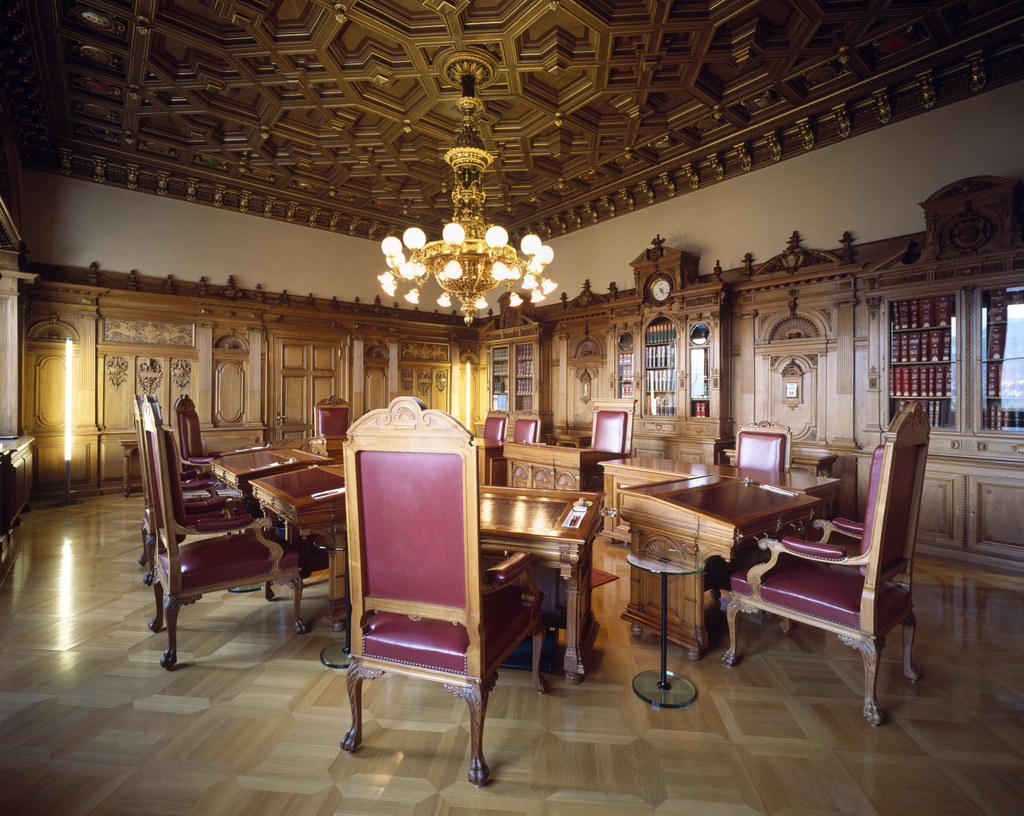Parliament opts for cabinet status quo

In the end there were no surprises. Parliament on Wednesday re-elected the six incumbent cabinet members along with Social Democrat Alain Berset.
Popular Finance Minister and member of the tiny Conservative Democratic Party Eveline Widmer-Schlumpf was re-elected easily in the first round of voting with a majority of 131 votes – 11 more than needed. It is the first time in history that a member of such a small party has been elected to the cabinet.
Other members of the government were also elected by clear majorities. The two Radical Party members Johann Schneider-Ammann and Didier Burkhalter easily held on to their seats despite questions over the party’s right to two seats after it returned a diminished vote in last month’s elections.
Berset, from the outset the favoured candidate to replace party colleague and outgoing Foreign Minister Micheline Calmy-Rey, was elected in two rounds having fallen just eight votes shy of an absolute majority in the first round of voting.
It was a terrible result for the Swiss People’s Party, which found itself virtually friendless with the other parties voting against its candidates in all but one of the seven votes.
Furious at the re-election of Widmer-Schlumpf – the former People’s Party member who unseated strongman Christoph Blocher in 2007 – the rightwing party announced the withdrawal of its candidate Hansjörg Walter from the race. It declared a sole candidate – Jean-François Rime – would challenge for all remaining seats.
It was a strategy that failed dismally, leaving the party with just one seat in the cabinet – despite it having the largest representation on the floor of the House of Representatives.
Isolation
Wednesday’s vote builds on the poor performance of Switzerland’s largest political party in this election year and leaves it more isolated than ever.
The party has said it will discuss its future at a party conference in January and has not ruled out relinquishing the cabinet seat held by Ueli Maurer and going into outright opposition.
Political scientist Georg Lutz said it was hard to predict what the party’s next move would be. He said the party was divided on whether to become more consensual in its style or to go into opposition.
“There are some people in the party that want to go into opposition. They say ‘we must make a statement’, but there will be others who say they lost because they didn’t have any friends,” said Lutz.
“To get elected you need friends, you need partners and they don’t have this because they have been fighting against all the others.”
Lutz said it was clear from the strategy adopted by the party for the cabinet election that Blocher still dominated the party. He said he doubted that he would relinquish power despite the failure of the cabinet campaign.
“Blocher is a believer and if you are a believer, you don’t turn around and say you were wrong,” Lutz said.
“My guess is that he will continue to dominate the party although there is also a lot of internal criticism that his strategy didn’t pay off. There will be some who will be saying the leadership is responsible for the successes, but also for the failures.”
Zurich University political scientist Michael Hermann told swissinfo.ch the results were a reflection of the will of the majority in parliament.
“We saw it in the cantonal elections for the Senate that the People’s Party didn’t win a majority,” Hermann said. “The party has problems in winning a majority, so if they are against everybody, everybody is against them.”
Majority over magic
Hermann said the easy re-election of Widmer-Schlumpf over a second People’s Party candidate reflected the fact that parliament was keen to avoid a cabinet majority held by the right-of-centre parties.
“I think that was the key, also it’s the same majority that put her into office in the first place that has now played again, so it’s logical,” he said.
For Hermann, the 2011 cabinet election demonstrates a “new dynamic” rather than the death of the so-called magic formula which in the past has seen the four strongest parties share power in the cabinet.
“You still have a [centre-] right majority in the cabinet,” he said. “It’s not a left majority. That means that the whole spectrum is in the government, it’s still a balanced government.”
Consensus
Dubbed the “concordance election” by the Greens, opening speeches delivered by the parties’ parliamentary group leaders saw most justify their voting positions based on interpretations of the magic formula.
Speaking on behalf of the People’s Party, Caspar Baadar said the parliament, if it did not reinstate the traditional 2+2+2+1 formula would be making “a deliberate choice” to change the system of government to one “similar to those internationally”, where majorities change all the time.
But the Christian Democrats’ Urs Schwaller was one of several party leaders to rebuke the People’s Party, pointing out that it was the decision to exclude Widmer-Schlumpf after her election in 2007 that was responsible for its diminished representation in the cabinet.
Ursula Wyss for the Social Democrats said that if the combined Radical and People’s parties held four of seven seats in the cabinet, they would have a majority despite their not having a majority in parliament.
Since 2008 the seven cabinet posts have been divided between the parties as follows:
Social Democratic Party: 2
Radical Party: 2
Swiss People’s Party: 1
Christian Democratic Party: 1
Conservative Democratic Party: 1
Re-elected to cabinet December 14:
Doris Leuthard, Christian Democratic Party, 216 votes
Eveline Widmer-Schlumpf, Conservative Democratic Party, 131 votes
Ueli Maurer, Swiss People’s Party, 159 votes
Didier Burkhalter, Radical Party, 194 votes
Simonetta Sommaruga, Social Democratic Party, 179 votes
Johann Schneider-Ammann, Radical Party, 159 votes
Newly elected:
Alain Berset, Social Democratic Party, 126 votes
Alain Berset, Social Democrat
Born in 1972 in Fribourg, Berset is married with three children. He studied political science and economics at Neuchâtel University from where he received a PhD in economics in 2005.
After working as a research scientist and political advisor, he was elected to the Senate in 2003 and was Senate president in 2009.
The term “consensus politics” describes the ongoing effort to achieve a balanced compromise among political parties and among the different cultural, linguistic and social communities that make up Switzerland.
The practice of distributing cabinet seats according to the relative strength of the parties in parliament was first adopted in 1959. Dubbed the “magic formula”, the unofficial power-sharing pact was undermined in 2007 when parliament elected Eveline Widmer-Schlumpf instead of her then People’s Party colleague Christoph Blocher. Widmer-Schlumpf and People’s Party cabinet member Samuel Schmid were subsequently expelled from the party, which went into opposition. The People’s Party’s Ueli Maurer was elected to the cabinet the following year when Schmid retired, and since then the party has been unable to regain the second seat.

In compliance with the JTI standards
More: SWI swissinfo.ch certified by the Journalism Trust Initiative















You can find an overview of ongoing debates with our journalists here . Please join us!
If you want to start a conversation about a topic raised in this article or want to report factual errors, email us at english@swissinfo.ch.